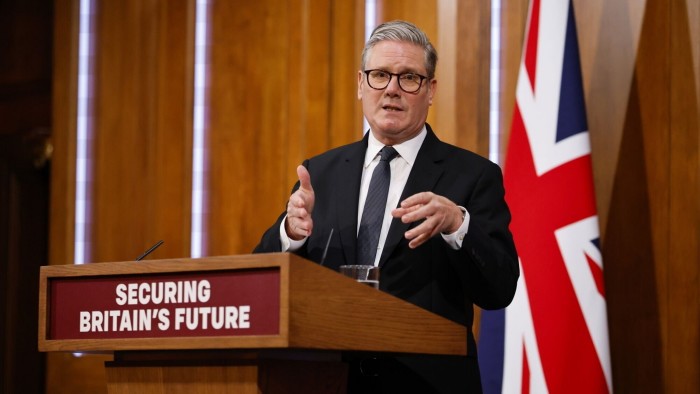British Prime Minister Keir Starmer on Monday announced a sweeping crackdown on immigration, warning that Britain risks turning into “an island of strangers” if it cannot maintain social cohesion. The plan includes doubling the residency requirement for automatic citizenship and tightening visa and language rules.
In a significant policy shift Starmer has announced a comprehensive plan aimed at reducing illegal immigration and addressing public concerns over high net migration. The new measures mark a departure from traditional Labour positions, acknowledging the economic and societal challenges posed by open-border policies.
Key Policy Measures of Starmer
Reduction in Net Migration: The government aims to decrease annual net migration by 100,000, targeting a reduction from the current levels of approximately 700,000 annually. The Home Office estimates that these changes could bring net migration down to about 240,000 by 2028
Extended Residency Requirements: The minimum period required for obtaining permanent residency will be doubled from five to ten years. This change is intended to ensure that immigrants are well-integrated into British society before being granted long-term status.
Tighter English Language Proficiency: To promote integration, the government is implementing stricter English language requirements for immigrants. This measure aims to facilitate better communication and participation in the workforce and community life.
Restrictions on Foreign Workers: The plan includes banning the recruitment of foreign care workers, raising employer surcharges, and limiting post-graduation stays for international students. Additionally, fast-tracked settlement will be restricted to high-contributing professionals such as doctors and nurses.
Addressing Illegal Migration at Source: Prime Minister Starmer has pledged £84 million over three years to fund projects in Africa and the Middle East aimed at addressing the root causes of illegal migration. These initiatives will focus on education, employment opportunities, and humanitarian support to help individuals in their home countries.
The proposed policy changes have elicited mixed reactions across the political spectrum. Critics from both the left and right argue that the reforms do not go far enough. Reform Party leader Nigel Farage and Shadow Home Secretary Chris Philp have labeled the plan as weak, while some left-wing Labour MPs have accused Starmer of pandering to far-right narratives.
However Prime Minister Starmer’s new immigration policy reflects a significant shift in the UK’s approach to managing migration. By focusing on reducing net migration, enhancing integration measures, and addressing the root causes of illegal migration abroad, the government aims to create a more sustainable and controlled immigration system. The effectiveness of these measures will depend on their implementation and the response from both domestic and international stakeholders.








